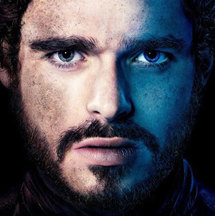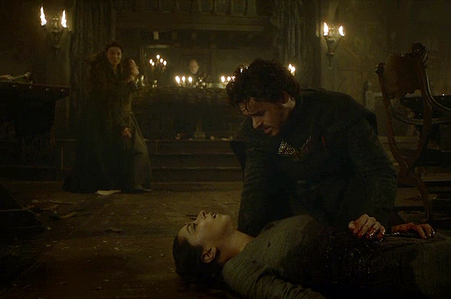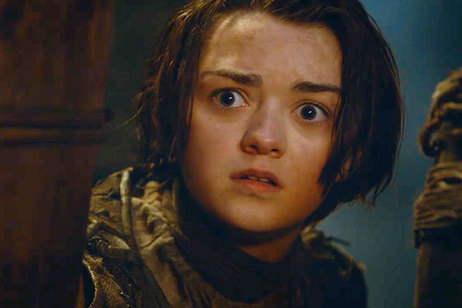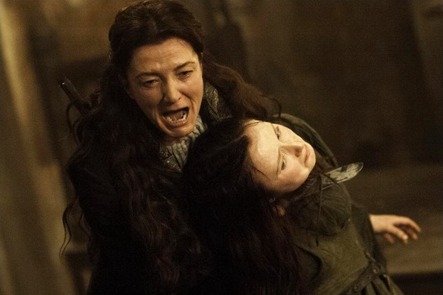
“And who are you?” the proud lord said, “that I must bow so low?” The unofficial anthem of House Lannister begins in this manner, and from there on in The Rains of Castamere is a sombre tale of death and misery. You can imagine my disdain when I found out what the name of this week’s episode of Game of Thrones was; this week’s episode, which just so happens to be the infamous ninth. Ever since Baelor in season one, episode nine has been recognised as a veritable harbinger of the end-times; Baelor saw the end of poor old Ned, and season two’s ninth featured the Battle of the Blackwater. Season three’s ninth episode featured something that I’m still finding hard to process, even now. It doesn’t need any explaining. If you’ve seen it, you’ve seen it. If you haven’t, I wouldn’t advise reading any further…

Certain characters in the show displayed a new kind of evil this week, namely Lord Walder Frey (David Bradley), and by mere association a number of other characters became all that more formidable, even when they weren’t in the episode itself. I’m not naming names, but one of them is the Lord of Casterly Rock.
I was never a great fan of Robb Stark myself. I know that won’t go down well with a lot of people, and it may be slightly disrespectful to say it so soon, but to me he just seemed to be a boy out of his depth with a head full of overly-ambitious ideas. It was his marriage to Talisa that did it for me. If I was King in the North, and I’d sworn an oath to one of the most strategically important houses in Westeros, I wouldn’t have simply run off and married a nurse from Volantis who I’d chatted to a couple of times and liked the look of. As far as I’m concerned, he shot himself in the foot with that particular turn of events, and he deserved to receive Lord Walder’s retribution. Having said that, what actually happened was just plain barbaric, there’s no other way about it. I’d have had no quarrel with Lord Walder and his armies meeting Robb and his remaining bannermen in the field to do honourable battle, but what actually happened was verging on genocide.
The King is dead, his mother is dead, Rickard Karstark is dead, Winterfell is a ruin, Robb’s armies are scattered to the wind, Roose Bolton is a Lannister turncloak, and Walder Frey is a c- (enough now). All that remains of “The North” is the trio of Stark children scattered across it, and Sansa.
Sansa. Have a think about that while you wait for the article that I’m writing as a follow-up to this one. There’s some very interesting theories surrounding the Red Wedding…

In fact, it was the writing that I found to be the most appealing factor about this episode. Differing from the usual back-and-forth nature of a Game of Thrones episode (i.e. going from the Wall, to Essos, to King’s Landing, to Riverrun, to the North, and back again), this week had a refreshing feeling of fluidity to it. I often find Game of Thrones is like watching five different shows all at the same time; whilst everything is linked together politically, as a story it doesn’t always feel particularly grounded. However, this week all of the scenes merged together effortlessly, and it felt like one large story as oppose to a sequence of smaller ones. We still had the same point-of-view chapter structure from the books (i.e. Jon, Arya, Bran and Catelyn), but everything convened to a point; one half culminated at The Twins and the other at the “windmill” in The Gift.
There was a big emphasis on characters unknowingly crossing paths with one another, a memorable moment being when Bran Stark (Isaac Hempstead-Wright) was mere metres away from Jon Snow (Kit Harrington); the person he’d been striving to find for the last eight episodes. Shame, then, when Jon was forced to flee into the Northern wilderness on horseback. The same can be said for poor Arya (Maisie Williams), who after literally a year of trekking across Westeros finally makes it to her mother Catelyn (Michelle Fairley), at the Twins, only for it to conclude in a similar vain.
All of the above relates to the sharp dialogue between Arya and Sandor “The Hound” Clegane (Rory McCann) as they stop a couple of miles south of the Twins. Clegane explains the fear Arya ashamedly has at finally reuniting with her mother; “You’re almost there, and you’re afraid you won’t make it. The closer you get, the worse the fear gets…” This applies to so many characters in this episode it’s unbelievable; Arya has almost made it to her mother; Robb has almost reaffirmed his relations with Walder Frey; Jon has almost made it to Castle Black, and Bran has almost made it to Jon. More to the point, the closer all of them get, the slimmer their chances become until it all crashes down on them in one way or another. A brilliantly constructed moment occurs after the Hound says the above, when Arya, -a ten/eleven year-old girl-, completely breaks through all of the superficial barriers surrounding Clegane, a man well-known for a his fierce demeanour, his fearlessness, and his love of killing. Arya exposes the actual core of The Hound and reveals the vaguely human side that emerges through his fear of fire. She quickly moves on to threatening him with the ambition of “putting a sword through [his] eye and out the back of [his] skull”. Whether you agree or not, it’s quite an important turning point in the development of the two characters; Clegane isn’t merely the killing machine he was before, and Arya is becoming darker and darker as the show goes on. I feel I ought to retract what I said about Arya “turning back into a little girl” in my last review.

The thing about this episode is that, because it was centred on so few people in such small range of locations, there isn’t a great deal for me to talk about besides. The Lannisters have risen as the real power behind the throne; the Freys have asserted their dominance in “the game”; The Kingdom in the North has crumbled like a sponge cake in the rain; and Daenerys has claimed the city of Yunkai for their own, and the age-old House Targaryen has been put back on the map.
There you have it, folks. I know right now we’re all thinking the same thing; “You really should have said more about the wedding”, and I agree, I should have. But the event itself was so horrific and traumatising to watch, and its reproduction in the show so immaculate (and possibly more shocking than in the book), that I don’t think I need to say anything more. We were all just as shocked as each other when we saw it, so we’re all in the same boat, thinking the same thing.
I feel for Edmure (Tobias Menzies) and Brynden Tully (Clive Russell) however. The former is Catelyn’s brother, the latter her uncle, and both completely oblivious to the goings-on inside the banquet hall.
Whatever happens, there’s going to be closure abound all over Westeros tonight as we reach the season finale…
Now the rains weep o’er his hall,
And not a soul to hear.

 RSS Feed
RSS Feed
